Excerpts
from "Internment Camps of Bangladesh"
Book by Loraine Mirza |
|
read book reviews |
buy books
|
|

|
15min 17sec |
The Ship Of The Damned Still Sails & The Long March
|
|

|
10min 29sec |
Geneva Camp
|
|

|
18min 54sec |
Mirpur Camps
|
|

|
6min 3sec |
The Remote Camps
|
|

|
5min 8sec |
Fire In Geneva Camp
|
|

|
12min 6sec |
Non-Bengalis in Bangladesh
|
Audio is presented in mp3 format
|
|
|
|
 |
Whatever the ethnic or linguistic origin of the original wave of
refugees who migrated to Pakistan, a very large segment of this
population was born in East Pakistan after 1947.
Many have asked me through the years why I struggle so hard to write
about a people in the world, few know or care about. The answer
lies in the question it self. It is precisely because nobody knows
or cares that I have stubbornly persisted. Nor will I cease that
mission until the last camp in Bangladesh is closed and the last
stranded Pakistani is granted the choice to either live as equal
citizens in Bangladesh or the right to enter and live as full citizens
of Pakistan.
|
| Only
two out of hundred kids have access to education and even that only
up to middle school. |
|
|
| |
The first lesson was when we made
three different stops in an attempt to get fuel for the Rickshaw.
Each time he rolled the sputtering pedicab in to a gas station,
he was refused service. Was there rationing? A fuel shortage?
“No, happens all the time,” he said. Sometimes I have
to go to many stations before I can find one who’ll sell
me fuel. Then I pay double. And sometimes I am refused everywhere,
and lose a day’s work”. Then with a sigh he added,
and of course I have to push the rickshaw all the way back to
the camp.” said Nurul Islam.
|

|
Camp
schools are the only place where the Biharis can learn to read and
write their own language; in the rest of the country Urdu is banned. |
|
| |
 |
A
man rushed out of the door way of his shelter. Suddenly his hands
were reaching for my throat and as others pulled him back and held
the violently struggling man, he screamed out, “Don’t
bring any more Pakistani tourists here. We’re not animals
in a zoo to be watched”. The man stopped fighting and sank
to his knees. He broke down sobbing, “I am old and tired.
I’ll die in this wretched camp”.
“I spent just a few days with husband who after marrying me
was going to take me to Pakistan with him. But then he just left…
abandoned me. Now I am left here with a child to raise and disgraced”. |
 |
A
brother and a sister killed when their hut collapsed during the
fire. |
Child fire
victim in traditional Muslim burial shroud.
|
|
|
| |
It was the conditions of the children
of the camp that hit hardest during the first full day there.
Most were thin, and bare-footed, the little one naked. The survival
rate of babies is about fifty percent, and the odds get worse
after weaning. Many had rickets, malaria and tuberculosis.
But despite the presence of missionaries, I saw
no evidence of offers of relief, food, clothing, medicine or medical
care. What I did see were missionaries standing around the schools
or where the children congregated, passing out bibles and offering
them a way out of the camps if they would accept Christianity.
|
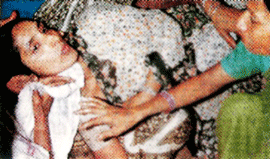
|
The
mother of the two children overwhelmed with grief. |
|
| |
 |
In
that way, according Husnain, the missionaries have managed to lure
eight thousand children from Mohammadpur camps to their missions
over the past five years. Once at the mission the children are put
to work making crafts and other things to sell to raise money. What
education they do receive is Christian indoctrination.
As for World Vision, it apparently uses the camps to make films
used in fundraising for the organization. None of the millions of
dollars World Vision raises with those heart-wrenching documentaries
ever benefits the Bihari camps.
With the Urdu language banned country wide, only in our schools
can they still learn Urdu. But they come also because their children
actually score higher in the examinations when they go through our
school. |
A
rare picture of the long march when a hundred thousand stranded
Pakistanis attempted to walk across India to Pakistan. |
|
|
| |
In 1978 General Ziaur Rahman ordered
the army to come and evict all Biharis who were still in their
homes and move us in to the camps. The army pushed a thousand
families from their homes to the camps. But a few sued in the
courts and were able to return to their houses.
Although they were back in their homes, the roads in front were
torn out, the water, the electrical and gas lines were closed
off. “And municipal tankers won’t come and drain out
the cesspools, nor do we have a way to dispose of garbage, except
to dump it outside the house”.
His 18 years old son had finally gotten a job as a bell boy, in
the same hotel he had once managed. A 16-year old son sat quietly
besides him and seemed to be ill and in pain. “I finally
got a doctor to examine him, but then I couldn’t get the
prescription for the medicine filled”.
|
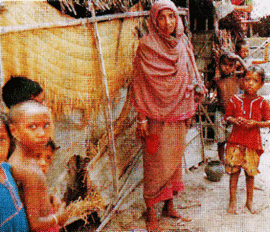
|
A
woman pleads for relief from the horror, the camps have been. “All
we want is for Zia ul Haque to agree to repatriation, we will walk
to Pakistan if we have to”. |
|
| |
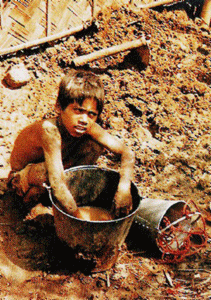 |
He showed
me the prescription, which had a notation at the left hand corner-Bihari.
There was no need to elaborate any further. This was a family that
never registered with the ICRC as Pakistanis. This was in fact a
family with Bangladesh citizenship.
“This fire was cause by the cyclone winds”, she began,
but we have had fourteen fires that were deliberately set, that
have burned the entire camp to the ground, a fire for each year
we have been here. Always on Ahsura. For us this place is Karbala
and every day is Ashura. |
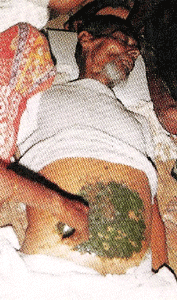 |
If
you are a child of the camps all you will ever know is hunger, persecution
and deprivation. What crime has this child committed? He wasn’t
even born in 1971. |
Painful
and prolonged death of a father of six, because no doctor or hospital
would agree to treat a Bihari. |
|
|
| |
In one of the huts a man was lying
on the floor with his family gathered around him. The wife of
the gravely ill man made a place for me to sit. “Papa had
a fever,” explained the eldest son, who appeared to be around
eighteen. “Then just last week he got sicker”. The
man’s bare midsection was swollen and a large patch of puffy,
black flesh was visibly spread across his abdomen, an indication
that he was unable to pass urine and that gangrene had set in.
He was comatose, and while his midsection was bloated, his face
and limbs were emaciated. “My father’s name is Khalil-uddin,
please write down his name and take a picture of him. Give it
to Zia-ul-Haque and tell him my father suffered and died for Pakistan.
|

|
This
girl of 13 who was so weak, ill and malnourished she was unable
to sit up. |
|
| |
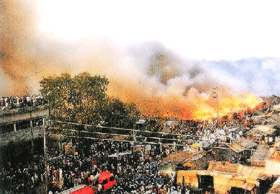 |
He
was right his father was domed. It took fifteen more days for Khaliluddin
to die. And though we made concerted attempts to get medical treatment
for him and others we found in dire need, we could get no doctor
to come or find one hospital that would admit them. The only response
was, “We don’t treat Biharis!”
As we were leaving Murapara Camps, we came across a little girl
sitting outside a hut making garlands of paper flowers. This was
one of the few sources for income in the smaller, remote camps.
“Can you sell a garland to me?” I asked. She thought
about it, then nodded.
“How much?” |
A
major fire in Geneva camp. Heavy smell of kerosene was reported
by eye-witnesses. The police did all it could to confine the residents
in the burning camp. Notice how far the fire truck is from the fire |
|
|
| |
“Five takas”, she said
after a long pause.
I took out a ten taka note (worth about 15 cents U.S.) and handed
it to her.
She looked the bill over carefully. “I don’t have
change”.
“Its alright, keep the change”. I was told later that
she probably earned no more than five takas for the entire consignment
of garlands.
She gave me an indignant look. “For ten takas take two,
because I’m not a begger.
“If things changed and you could receive all the full rights
of citizenship in Bangladesh, would you then be willing to stay
here?”
|

|
IThere
have been so many fires in so many camps that international relief
agencies have started considering them too frequent to be accidents |
|
| |
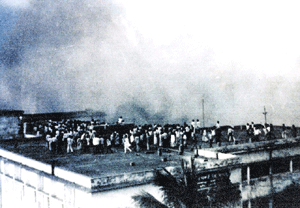 |
“No!”.
was the resounding answer to that question, not only from them,
but almost everyone in every camp.
“I spoke fluent Bangla but my height singled me out at once
as a non-Bengali”. Ahmed is large framed six foot three. He
described his attempts to leave his home, even six months after
the war. “People would see me on the street, spit on me. Roving
gangs went after me. Even my neighbors who had been friendly before,
would call me Bihari rubbish”.
There was no evidence of Bangladesh offering the full rights citizenship
to non-Bengalis, unless forcing them to pass themselves off as Bengalis
in order to work, receive education or even move about freely in
the streets is considered a legitimate form of assimilation. |
Smoke
rising after the fire ran out of combustibles. |
|
|
| |
“After a policeman beat my
father to death in the camp, my mother told me to get to Pakistan.
I was scared. No money, I did’nt even have shoes on my feet.
But my mother said she would rather I get killed trying to go
to Pakistan. Better to die then live with no future. So with nine
other boys, we escaped on foot”.
“Are you saying you walked all eleven hundred miles from
the camp to Pakistan?”
Well in India we had some help. We could find some work, and earned
enough to get at least as far as Northern India by bus, or hitching
rides. But we had to walk the rest of the way, and that was when
things got really hard. Only four of us made it.
|
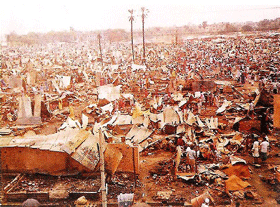
|
IThe
day after: After every fire the residents are left with just the
clothes on their backs and an open sky over their heads. |
|
| |
 |
“What
happened to the others?”
“Three died of thirst in the desert.” Pain crossed over
his young face as he described the death of the other two. They
were caught by Indian border patrols and shot.”
“Why were they shot?”
“Because there is no where to deport us. When we get caught,
so they just shoot us.” He then told me how he forced himself
to walk on feet that had become raw and bloody after the shoes he
had bought for himself in India had worn out.
“How has life been for you since coming to Pakistan?”
“Hard and it is not getting any easier. Still it’s better
than Bangladesh. It took four years to save enough money for a broker
to bring my mother and sister here.
“The last time I saw Mustafa was on the afternoon of April
21, 1986. He waved at me as he passed carrying one pole of a large
banner during a repatriation demonstration in Orangi Town.”
Uniformed police opened fire on peaceful demonstrators, Mustafa
was one of those killed.
I was in the seventh class and living in the railway quarters in
1971, he explained. He saw his cousin lured out of their house and
then killed by his close Bengali friends in early March. “Then
the day after the fall of Dhaka, police came and shot my father
to death through the window of our house. Soon after that the army
appeared and forced them to leave their homes and go to the camp. |
A
copy of the notice of eviction posted on the door of a Bihari home-owner.
After creation of Bangladesh all Bihari homes and businesses were
confiscated by government decree. |
|
|
| |
“There were seven West Pakistanis
in Bogra, working on an EPID project, taken prisoner with us,”
he said “They were separated and immediately shot in front
of us.
When they ran out of jewelry to sell, her husband escaped from
the camp and then in 1984 brought her and the children to Pakistan
through a broker. She lives in a neatly kept house near the bottom
of Orangi Town. Her husband, since coming to Pakistan was never
able to return to work on the railway. “And although the
railway owes my husband back pay and he should get a pension,
he hasn’t been able to collect what is due to him.
They are also among the tens of thousands without legal status
in Pakistan. In 1988 when I returned to Pakistan and intended
to revisit her, I learned that Rehana Khatoon and some members
of her family had been killed on December 13, 1986 during the
attack by Pathans and Afghanis just after the drug raid in Benares
Chowk.
|
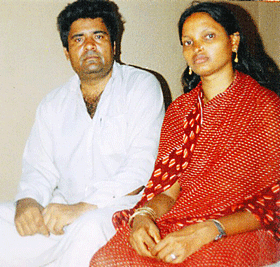
|
Mr.
Rana allegedly a physician and a lawyer from Karachi, but most decidedly
a cheat, who married a woman from the camps and then abandoned her
at the end of his vacations. |
|
| |
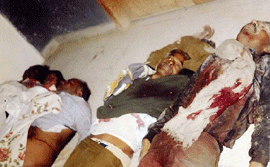 |
Ansari
then said he wanted to live in harmony with all his Muslim brothers.
“And I don’t resent aiding the Mujahadeen. The Afghans
in Benars Chowk are not part of the frredom fighters, and I realize
that .” He also did not resent the presence of an estimated
one million Bengalis in Pakistan. “All I want is the right
to also live in Pakistan. Yet I have been denied the right to call
myself Pakistani. I can’t get an identity card and that makes
it hard to get a job that pays a living wage.” |
Four
men killed in Orangi Township, by the goon squad employed by the
police. |
|
|
| |
“I was only fifteen when the
war broke out”, Muzaffar Uddin began. “By then I’d
been traveling with the Pakistan army, acting as a scout since
they arrived in March.” When the unit he was attached with
surrendered to the Indian forces he was with them. The Mukti Bahini
placed his name on a hit list for immediate execution and were
demanding that he be turned over to them.
His commanding officer in the Pakistan army unit intervened and
insisted that Muzaffar be allowed to accompany them as a prisoner
of war to India. “Very few Razakers were able to go with
their units as POW’s. But I was fortunate to have a commanding
officer who stood by his volunteers. Thousands of young men, barely
in their teens like me, were either just left on their own or
allowed to be turned over to the local authorities. And what it
meant to be turned over to the local authorities was instant execution.
Trials? No. There were no trials.”
|
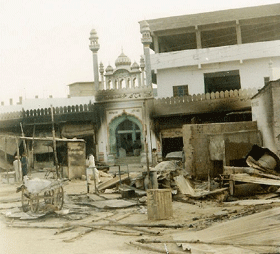
|
Government
hired thugs not only killed innocent men, women and children but
also trashed the local masjid. |
|
| |
 |
“I
am here legally but I have been denied the right to even sponsor
my own family to bring them here legally”. Muzaffar was thirty
years old at the time of the interview, but because of the need
to bring the rest his family and limited finances he has not been
able to get married and start a family of his own.
“Before the Pakistan Army arrived my cousin had been tortured
and brutally killed by the Mukti Bahini. He was my age, fourteen
at the time. His eyes were gouged out, his throat slit. We found
his body on the road.” Syed Shamim Javed. |
Copies
of the Quran burned by the hired hands of the Pakistani police. |
|
|
| |
“To be paid a taka a day because
I was a Bihari. No Bengali would have worked for that. No Bengali
would have had to work for that!”
Was Qaiser bitter?
“No, just sad.”
He does not see any difference in the attitude of the Bengalees
and those in Pakistan toward refugees who came from India, and
those more recently from Bangladesh. And while he may decide to
settle in the United States, he said he hasn’t forgotten
his stranded brethren and is active in an organization in New
York that is lobbying for repatriation.
|
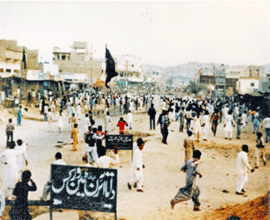
|
Crowd
assembling for one of the many peaceful demonstrations to press
for repatriation of Stranded Pakistanis. |
|
| |
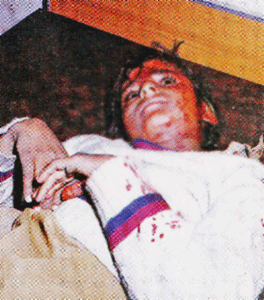 |
A
shipload of refugees was turned away from the American shores. With
no country willing to give them sanctuary, the ship was forced to
return to its home port. What awaited those passengers was death
in concentration camps. The year was 1939. The country, if you have
not guessed by now, was Hitler’s Germany. And the passengers
were Jews.
The parallels between the Jews of World War II Europe
and the Biharis of Bangladesh does not step there. Both were minority
groups, labeled as traitors, accused of being previliged and used
as scapegoats. Both became targets of mob mentality that was whipped
up by their leaders. The very name, Bangladesh, roughly translated
into English is Bengali Nation, and conjures up the same image as
Hitler’s Aryan Nation, with its basis of racial purity and
nationalism as a central theme. And in both cases, the world closed
its eyes on the plight of the victims. |
Mustafa,
One of the young participants in a peaceful march to press for repatriation
of Stranded Pakistanis, killed by unprovoked and deadly use of force
by the local police. |
|
| |
|
| |
Sometimes around midnight of July
12, 1977, the refugees were ordered to jump, or thrown overboard.
Many were small children and women. Many could not swim. The ship
then departed. The sun rose that morning and I went to the scene
and saw for myself the horror of bodies floating in the harbor.
For weeks afterwards, fishermen were recovering bodies washed
out to sea or on the shores of the coast.In another era the world
had closed its eyes and only after six million Jews perished do
we now hear countless stories of the Holocaust. Much too late
for the six million, but certainly it should serve as a lesson
of what can happen when a people are allowed to be persecuted
with immunity.
|

|
Police
arriving by the truck load to deal with peaceful demonstrators. |
|
| |
Yet from 1971 to the present, the
plight of the Biharis leaves serious doubts that we really learned
the lessons of the past.
|
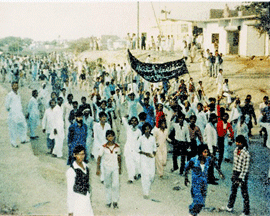
|
Crowd
assembling for another demonstration. |
|
| |
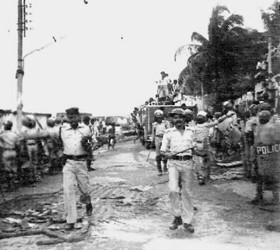 |
The
fact that a people, who because of the language they speak have
been allowed to languish in camps and found no shores in the world
offering sanctuary, and no protests about their plight, must mean
we have not learned a thing.
Bangladesh could not isolate or deprive a minority group of basic
human rights if there was a world voice out there protesting. The
Biharis would not have been marooned in that hostile land if there
was a world out there to put pressure on the government of Pakistan
to fulfill their moral obligation.
Allowing this to go on, is not only condemning 300,000 men, women
and children, but other potential victims in some other part of
the world, when some government decides they speak the wrong language,
are the wrong color or practice the wrong religion, and decides
it can get away with oppressing another minority population without
interference. |
Another
scene of police action against residents of Orangi Township. |
|
|
| |
|
Are we doomed to repeat the same journey on ships that land only
on death’s shores? There might even be a ship, bound for nowhere,
with a berth waiting in it for you and me.
The Biharis were depicted as privileged and collaborators, thus
deserving lifelong sentences, not only for the adults but for every
generation that followed.
Ahsan himself had lost his sister, brother in law and four of their
children. When he reached Rajshahi with his unit and gone to their
house to find them, they had disappeared. After a search they found
their bodies buried in the courtyard. All had been hacked to pieces
except for his sister, who was six months pregnant at the time.
She was found buried alive. |

|
| Commerating
the death of innocents at the hands of police and their accomplices. |
|
| |
 |
Still missing were their two youngest daughters who were two and
four years old. A few days later, after giving up hope that he would
find his nieces alive, a Bengali servant who had worked in their
house turned up at the Cantonment in Rajshahi. With him were the
two little girls. Ahsan (now retired) and his wife were raising
the orphaned girls in Karachi.
Only 275 of the 19000 children in camps go
to school. Only six of the 66 camps have a school.
“All we want is for Zia ul Haque to
agree to repatriation. We will walk to Pakistan if we have to”.
Major Mirza Murtaza Ali (Retd.): But there
was massive slaughter and rapes of the Biharis by the Bengalis and
we came upon the bodies in mass graves, clogging every river and
pond in every village, town and city we went through. |
The
consequence of asking for your rights in Pakistan. |
|
|
| |
|


